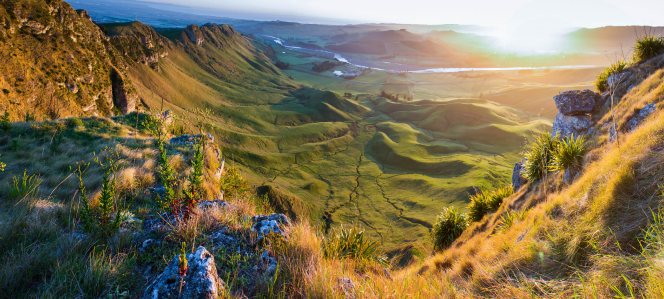It is said that old heresies never die; they just keep coming back in different forms. There is truth to this and I find it revealed in the pervasive spirit of Gnosticism present in our culture and time – specifically, Gnosticism’s denial of nature and creation. Historically, Gnosticism was a blending of aspects of Christianity, philosophy, and Eastern mystery religions that challenged the orthodox faith in its first centuries. Gnosticism highlighted secret knowledge as key to salvation as well as denigrating what it saw as the shackle or prison of creation and the physical body. The early Church had to answer the distortions of Gnosticism and it did so by maintaining the continuity of the same God revealed in the Old and New Testaments and holding to the profound truth of the incarnation.
Now, jump ahead to America in 2017. It seems a contradiction and an irony that in a time that prides itself on being increasingly “ecologically conscious” we find the re-emergence of the gnostic temptation of denigrating and fleeing creation but this, I would propose, is exactly what is happening. We find this temptation to flee the “confines” of creation all around us. For example, we see trends in body modification from large tattoos to the extremes of plastic surgery and body building. There’s also the felt need for a plethora of distinctions in gender identification (apparently the biological stamp of “male” and “female” no longer suffices and gender can be determined distinct from biology and creation). In addition, we see the temptation to play God and use advances in technology and scientific understanding to craft babies to our liking. What is common in all of these (and many more) seeming disparate social trends? I would argue that one element held in common is the gnostic trend to seek to flee the confines of creation.
In this context what then is the Christian to do? Be radical; make the choice to live within the reality of nature. Here is a point to reflect upon: for those who participate and pray the Liturgy of the Hours, look through your Breviary and notice how many of the opening songs of morning and evening prayer refer to creation and grace. You’ll discover that the two are not opposed. This is the genius of Christianity on display and the prayer of the Church is teaching us an essential truth. Grace does not abolish creation nor does it overcome it; grace sustains creation, peacefully enters within it to heal and work with it. Creation is not to be fled from but rather embraced because within the very “confines” of creation, God’s grace is at work and to be found. Any attempt to flee creation is based on error and confusion.
With all that said, what does it mean to be radical and actually seek to live within the reality of creation? Here are some suggestions:
Accept yourself for who you are and others for who they are. Throughout Scripture we are reminded again and again that God is the creator and that God loves his creation. That includes you, me, and every other person. Yes, there is the reality of sin and our need for a savior but the savior has come and his healing grace is offered. Allow God’s gentle grace to work in your life. Part of living with this gentle grace, I believe, is to not give in to the common temptation to affix a label to oneself or others. The human person is an ever-dynamic mystery; labels cut off mystery. Be willing to live in this mystery and trust that God is at work.
Celebrate the sacraments. Sacraments reveal in an utterly unique way the reality of grace working through creation and not opposed to creation. Learn the wisdom of the sacraments not in an attempt to “figure it out” but rather to live in the mystery and through them to be brought to deeper understanding.
Develop a mature understanding of Scripture, especially the Gospels. Gone are the days when Christians could get by on leaving the Scriptures to the “professionals”. A part of every day should be spent with the Scriptures, particularly the Gospels. Notice how creation plays a major part throughout the Gospel story, i.e. Jesus walking on water, the star of Bethlehem, Jesus teaching on the lilies of the field, Jesus and the disciples walking on the road, the bread and wine used for the last supper – the list could go on and on.
Fast. Hunger has a way of clarifying priorities and through fasting we are quickly reminded that we are embodied beings.
Develop healthy friendships. True and healthy friendships, though rare, are a gift from God. Friendship helps to anchor us in ourselves and in our world.
Turn off the TV and social media. Entertainment and social media certainly have their place and can be beneficial tools in helping to enlighten and educate the human spirit, but my experience has shown when not used in a measured and balanced way they quickly lead to isolation, superficial relationships, and a chronic cynicism which stunts maturity and can become a besetting sin.
Enjoy nature. Creation gives glory to the Creator. Creation also teaches, gives insight, and enables us to gain perspective.
Practice humility and through this practice realize that we are part of something much bigger than ourselves.
Not long ago I was out for a walk in the mountains, coming over a rise I was met by a herd of at least eight deer peacefully and calmly grazing in a field and drinking water from a stream. They noticed me but rather than seeming startled and bounding away they calmly moved off into the woods. It was a beautiful sight and a gift. Like the deer that yearns for running streams so my soul thirsts for you my God.
Creation is not to be fled from. Be radical and choose to live within the context of creation.
